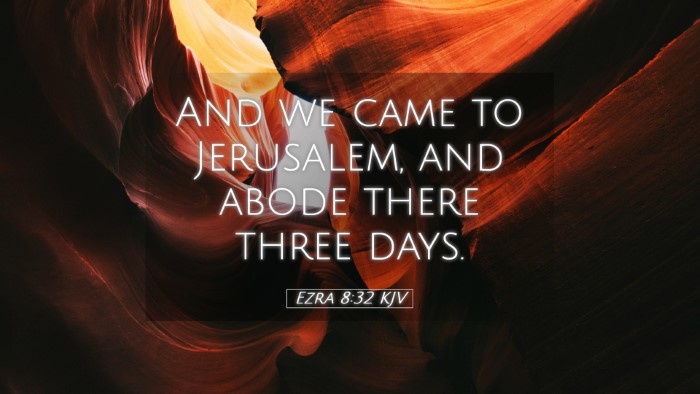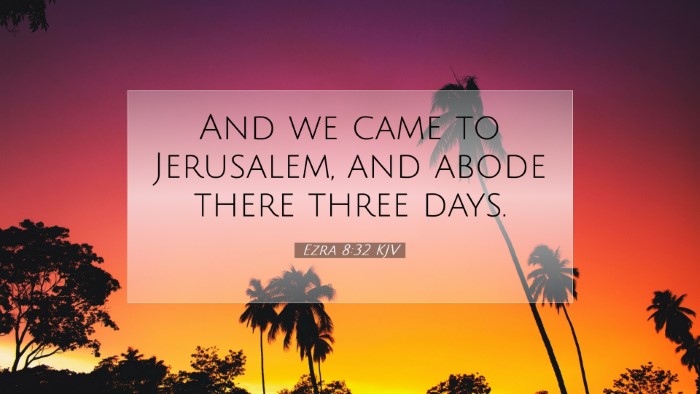Commentary on Ezra 8:32
Ezra 8:32 states, "And we came to Jerusalem, and abode there three days.". This verse marks a significant moment in the journey of Ezra and the returning exiles. The return to Jerusalem signifies not only a geographical arrival but also a spiritual and communal restoration. Below, we explore the insights from notable public domain commentaries.
Contextual Overview
The book of Ezra chronicles the return of the Jewish exiles from Babylon to Jerusalem, emphasizing the importance of rebuilding both the temple and the community. Ezra, a scribe and priest, leads this second wave of returnees after the initial group led by Zerubbabel. The preceding chapters outline the journey, preparations, and the resources God provided, illustrating His faithfulness throughout the return.
Insights from Matthew Henry
Matthew Henry offers profound reflections on this passage, emphasizing the significance of their arrival:
- Divine Protection: Henry highlights how God’s providence protected Ezra and the returning exiles on their journey. Despite the dangers they faced from enemies and the treacherous terrain, they arrived safely in Jerusalem, indicating the Lord’s hand was upon them.
- Preparation for Arrival: The three days spent in Jerusalem are seen as a time of preparation. Henry suggests that this was crucial for both physical and spiritual readiness. It allowed the exiles to acclimate to their new environment before engaging in their tasks.
- Importance of Community: The gathering of the returning exiles in Jerusalem symbolizes the rebuilding of the community. Henry notes that communal worship and unity are essential for restoration, showing that the physical return paralleled a spiritual revival.
Insights from Albert Barnes
Albert Barnes provides a detailed exegetical perspective, focusing on the implications of their journey’s conclusion:
- Chronology of Events: Barnes stresses the significance of the three-day period, as it marks a deliberate pause. He suggests that this time was spent to organize and prepare for the challenges ahead, reflecting wisdom in leadership.
- Spiritual significance: The act of residing in Jerusalem underscores a commitment to God’s covenant. Barnes interprets their presence as a pledge to restore worship practices and the observance of the law in the restored temple.
- Reflection of God’s Faithfulness: The arrival in Jerusalem serves as a testament to God’s faithfulness to His promises. Barnes emphasizes that their safe journey was a fulfillment of God’s word, confirming that He fulfills His promises to His people.
Insights from Adam Clarke
Adam Clarke adds layers of cultural and historical context to the narrative, offering valuable insights:
- Significance of Jerusalem: Clarke elaborates on the historical importance of Jerusalem, which was not merely a city but a representation of God’s chosen people. Their arrival symbolizes hope and restoration after years of exile.
- Geographical and Cultural Influence: He points out that the location of Jerusalem was significant for the returning exiles. It was a cultural hub where they could preserve their identity and heritage, bringing the Jewish tradition back to its roots.
- Importance of Worship: Clarke notes that the three days allowed for realignment with their identity as God’s people. It served as a precursor to the renewal of worship and adherence to the Torah, indicating their commitment to God and His laws.
Theological Themes
This brief verse encapsulates several profound theological themes that resonate with various audiences, including:
- Divine Guidance: The safe arrival of Ezra and his companions demonstrates God’s guiding hand throughout their journey, reminding believers of the importance of seeking divine direction in their own lives.
- Restoration and Renewal: The act of returning to Jerusalem symbolizes the larger narrative of restoration that God offers His people. It encourages modern readers to reflect on their spiritual journeys and the renewal offered through faith.
- Community Resilience: The gathering of the people illustrates the strength found in unity. It is a crucial reminder of the importance of community in faith and the shared responsibility in the worship of God and service to others.
Practical Applications
For pastors, students, and theologians, this passage invites various practical applications:
- Encouragement for Leadership: As leaders, it is essential to guide communities through times of transition with wisdom and reliance on God’s guidance, echoing Ezra’s leadership model.
- Importance of Preparation: The three days can serve as a reminder that intentional preparation is vital in church initiatives, whether in ministry, missions, or personal spiritual growth.
- Promoting Community Worship: This verse emphasizes the importance of coming together in worship as a community, fostering unity and collective strength as believers.
Conclusion
Ezra 8:32, though seemingly simple, encapsulates a rich narrative of hope, divine purpose, and the community's role in restoring the worship of God. The insights drawn from the commentaries of Matthew Henry, Albert Barnes, and Adam Clarke deepen the understanding of this verse, highlighting its theological implications and practical applications. It stands as a testimony to God's unwavering faithfulness in the lives of His people, encouraging them to embrace their spiritual journeys together in unity and faith.


